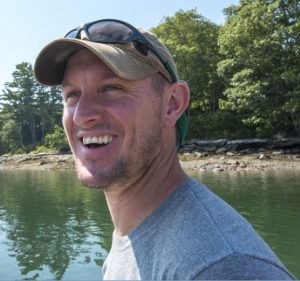Research Highlights: Current research connecting climate change, fishermen and marine resources
Background
My research takes a unique viewpoint bridging two distinct histories. I am a trained anthropologist with a focus on human-environment interactions in the context of climate change. I am also a third generation lobsterman who has spent more than 22 years in Maine’s iconic lobster industry. I like to think that my background provides me with a healthy mix of academic rigor as well as a real-world pragmatism. In reality, I often find myself and my opinions torn between my two worlds – wondering if my passion for the industry that helped raise me is clouding my academic judgment, or if my academic aloofness is separating me from the real world problems facing fishermen.
I am a Ph.D. student in the Adaptation to Abrupt Climate Change National Science Foundation IGERT fellowship program pursuing a degree in Anthropology and Environmental Policy. This fellowship is a joint endeavor between the University of Maine Climate Change Institute (CCI) and the School of Policy and International Affairs (SPIA). My work focuses on how rapid changes to earth’s climate system impact resource harvesters. Specifically, how extreme ocean events impact the perceptions and behaviors of marine-resource harvesters. Currently, I am examining how extreme temperature events within the Gulf of Maine over the past several years may have impacted and potentially undermined many of the successful conservation practices that Maine lobstermen have had in place for the past half-century.
Research
I am involved in three distinct research projects investigating the interaction of climate change, fishermen and marine resources.
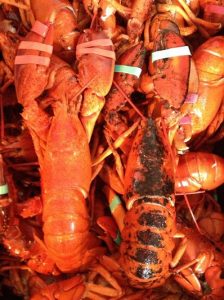
The first project examines the conditions that promote the spread of Epizootic Shell Disease (ESD), which causes lesions on a lobster’s exoskeleton (Figure 1). Research is being conducted alongside two of my fellow UMaine IGERT Ph.D. students, Kisei Tanaka of the School of Marine Sciences and Jared Homola of the School of Biology and Ecology. The primary goal for this project is to assess the level of concern about ESD among stakeholders.
Information provided by lobstermen and resource managers will guide the project and ensure that we provide them with the information necessary to adapt successfully. We will utilize online resources to track the spread of ESD and communicate the environmental factors contributing to its spread. With the development of a predictive tool, those involved in the industry can be proactive, rather than reactive, in planning for the potential future conditions of Maine’s iconic crustacean.
A second project in which I am involved is a collaborative effort between UMaine Sea Grant, Massachusetts based Social and Environmental Research Institute, and North and South Carolina Sea Grants. The overall goal of this project is to work with coastal communities (one on Maine, one in Massachusetts and one in South Carolina) to help them visualize how climate change may affect their communities and what they can do to mitigate and adapt to these impacts (Figure 2).
The principal investigator of the Maine portion of the project, Esperanza Stancioff, and I have been working on the final stages of the project which includes co-developing a ‘system dynamic’ model with Maine lobstermen that captures how climate change impacts fishermen’s income (Figure 3). This type of model is beneficial because it allows fishermen and managers to experiment with different fishing strategies in response to changing environmental conditions. Additionally, we are currently seeking grant funding from the National Oceanic and Atmospheric Agency that would allow us to expand this model to include more climate change data and more complete environmental and ecological data. Most importantly, expansion of the program would provide the opportunity to include the thoughts and concerns of the Maine Lobstermen Leadership Initiative, a group of young lobstermen representing the future of the industry, into future modeling efforts.
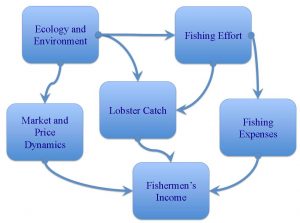
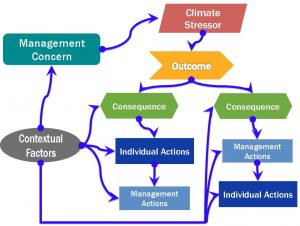
Finally, the Aquaculture in Shared Waters project is a joint project between Maine Sea Grant, University of Maine School of Marine Sciences, University of Maine Cooperative Extension, Maine Aquaculture Association, Maine Aquaculture Innovation Center, Coastal Enterprises Inc., and the Island Institute. The goal of the first round of this project (of which I was not part) was to prepare fishermen to start an aquaculture venture and to conduct social science research to understand the attitudes, perceptions, and knowledge of fishermen with respect to this change. During this program, fishermen at the Interstate Lobster Co-Op and the Corea Lobster Co-Op attended an intensive and thorough training in aquaculture production of bivalve shellfish and marine macroalgae (seaweed). Classroom work was paired with applied, hands-on activity, so that fishermen became well rounded from both the theoretical and practical perspectives. The educational program was designed to prepare participants to file a lease application with the state and begin production operations. Simultaneously, research staff conducted interviews with the students and other community members. The insights gained from this important research allow the partners to understand the social dynamics involved, and have improved our understanding of the challenges and opportunities involved in the transition from fishing to aquaculture.
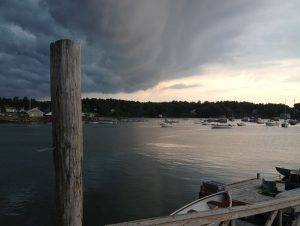
As a follow up to this project, I am assisting in replicating these efforts with clam harvesters from the towns of Brunswick and Harpswell, Maine. These courses and the research that surrounds them are great opportunities to give marine resource harvesters and their communities useful tools that can help them diversify their businesses in the face of resource depletion and environmental changes.

